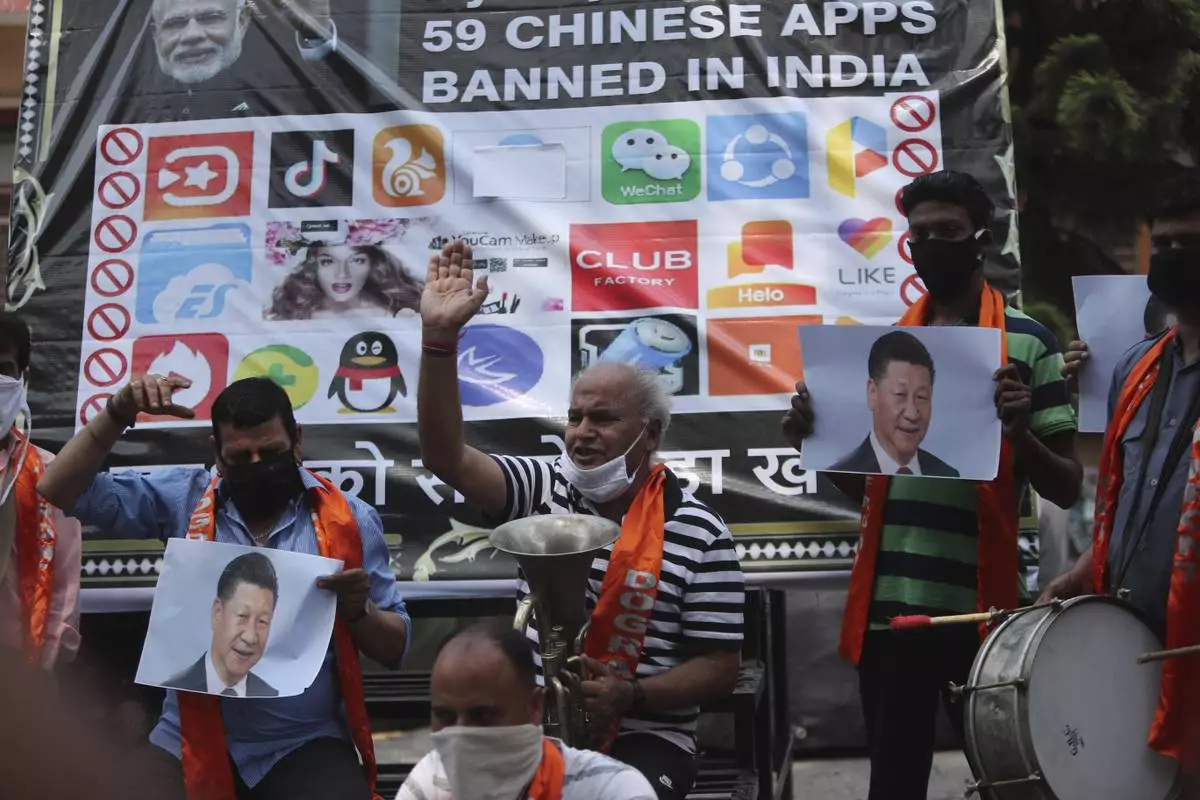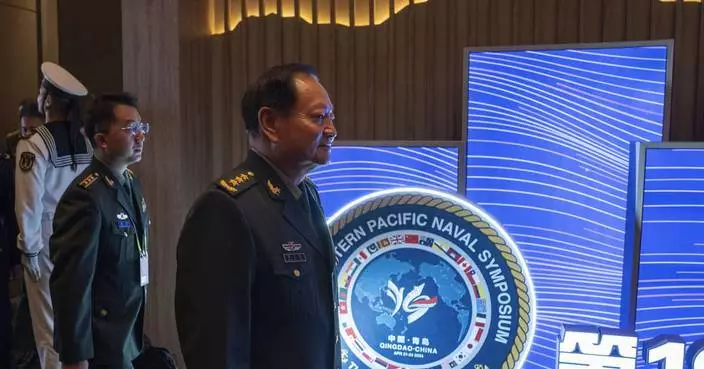Elizabeth Warren started the day with an apology, repeating her regrets for her past claims of Native American heritage. She ended it with a clear sign that Democrats aren't holding the mistake against her — her largest crowd yet.
The arc of the day Monday captured the strengths and struggles of a presidential candidate who has made significant headway in a Democratic primary otherwise notable for its stagnation. The Massachusetts senator stands apart by having demonstrably improved her standing since her party's White House field solidified in the spring while her competitors have risen and dipped in the national conversation and polls.
Some reasons for Warren's rise are easy to spot. When she landed in Minnesota on Monday, her first stop in a state Republicans are eyeing to win next year, she brought a forward-looking message, a sophisticated ground operation, a folksy persona and an upbeat outlook.
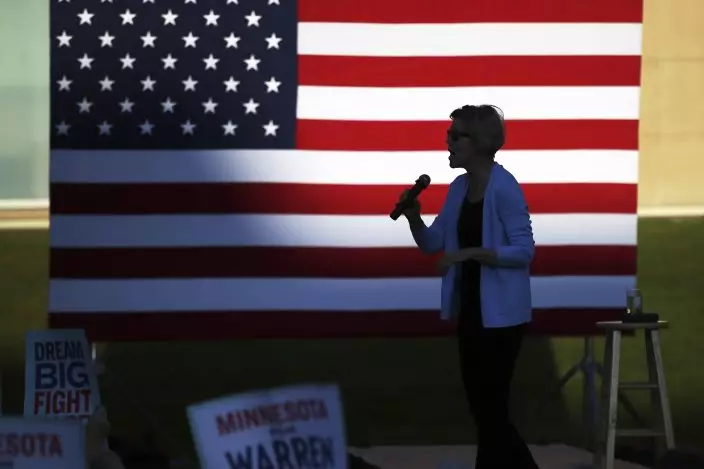
Democratic presidential candidate Elizabeth Warren, D-Mass., is silhouetted as she speaks during a rally Monday, Aug. 19, 2019, at Macalaster College during a campaign appearance in St. Paul, Minn. (AP PhotoJim Mone)
"It looks like Minnesota is ready for some change in Washington!" Warren said to a crowd of several thousand, an enviable crowd size for any Democrat, including Minnesota Sen. Amy Klobuchar, a rival.
But Warren's challenges were just as clear. She continues to have no easy response to President Donald Trump's nickname for her — Pocahontas — an insult that, despite her efforts to move past her previous claims of tribal ancestry, reminds Democrats already nervous about her general-election viability of her biggest political unforced error. And the voters who filled a college green in St. Paul were overwhelmingly white, a reminder that she has not yet secured the diverse coalition she needs to win the nomination.
Warren on Tuesday took steps to expand her support with black voters, who largely favored Vice President Joe Biden in a poll released last week by the Pew Research Center, by unveiling a detailed criminal justice proposal. Underscoring the importance of filling a gap on her long list of plans for America's ills, particularly for voters of color, Warren held a meeting with criminal justice reform proponents in Minneapolis.

Democratic presidential candidate Elizabeth Warren, D-Mass., speaks during a rally Monday, Aug. 19, 2019, at Macalaster College during a campaign appearance in St. Paul, Minn. (AP PhotoJim Mone)
The current criminal justice system "is not working," Warren said at the Tuesday event, and "it's not serving the whole country."
Her proposal includes a tripling of funding for the Justice Department's Office of Civil Rights, designed to increase oversight of police departments dealing with high rates of officer-involved violence, and a proposal to expand the rights of incarcerated individuals who want to contest their imprisonment.
Connecting with black voters isn't the only challenge Warren's campaign faced head-on this week. On Monday, she opened up remarks to a Native American forum in Iowa with a direct apology for past claims of tribal ancestry.
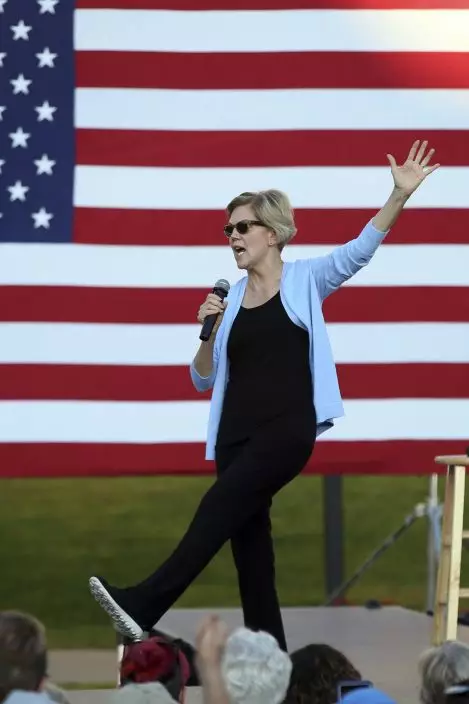
Democratic presidential candidate Elizabeth Warren, D-Mass., speaks during a rally Monday, Aug. 19, 2019, at Macalaster College during a campaign appearance in St. Paul, Minn. (AP PhotoJim Mone)
Her remarks were well received by tribal members in the audience who said they had already moved on from the matter.
"That's old news," said Gary Funmaker, of Black River Falls, Wisconsin.
National Congress of American Indians CEO Kevin Allis, a tribal member of the Forest County Potawatomi Community, said in an interview that his group is not in a "position to make judgments on what people believed when they were growing up" and added that Warren is one of several contenders who "are willing to take on our issues and address them."
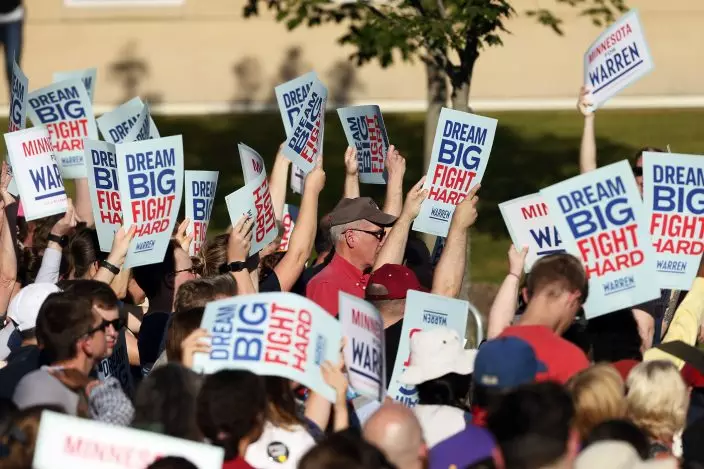
Supporters wave signs before Democratic presidential candidate Elizabeth Warren, D-Mass., speaks at a rally Monday, Aug. 19, 2019, at Macalaster College during a campaign appearance in St. Paul, Minn. (AP PhotoJim Mone)
Having Native American defenders at her side could help Warren when Trump, inevitably, continues to mock her. The president last week promised to revive the derisive nickname, even suggesting that he'd misjudged his timing in hitting Warren with it too early.
There was no mention of the flap by the time Warren arrived in Minnesota.
Warren beat her chief rivals — Biden, California Sen. Kamala Harris and Vermont Sen. Bernie Sanders — to the state known for its progressive tradition, high voter turnout and, this year, as a possible battleground in the general election. Minnesota's primary election is March 3, but absentee voting begins Jan. 17, two weeks before the Iowa caucuses.
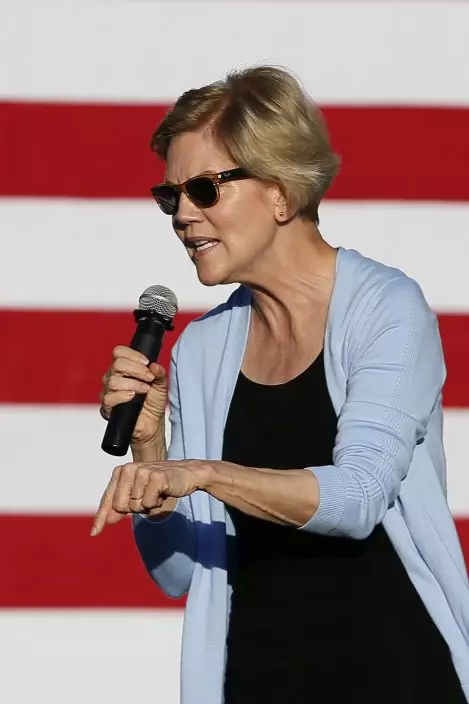
Democratic presidential candidate Elizabeth Warren, D-Mass., speaks during a rally Monday, Aug. 19, 2019 at Macalaster College during a campaign appearance in St. Paul, Minn. (AP PhotoJim Mone)
Warren's event was billed as a town hall at Macalester College, a private liberal arts school. But it was moved outside to accommodate the large crowd, and Warren focused on her biography-heavy campaign speech, sprinkled with stories of her Oklahoma childhood propelling a call for "structural change."
Unlike Sanders, Warren has not anchored her campaign on her support for single-payer health care and rarely mentions Trump. She spends much of her time on a proposed "wealth tax" on the ultrarich. The crowded responded with chants of "Two cents!" — a reference to the amount of every dollar Warren wants the rich to pay for universal preschool and child care.
Her campaign appears poised to capitalize on the enthusiasm. Attendees at Monday's rally texted the campaign to gain entrance, helping Warren build her list of supporters and potential small-dollar donors. She did not let the crowd size deter her from her standing promise to take a selfie with supporters who wait in line for one. The wait on Monday was long. Warren's campaign says she took 2,500 photos after the rally, sticking around for nearly three hours.
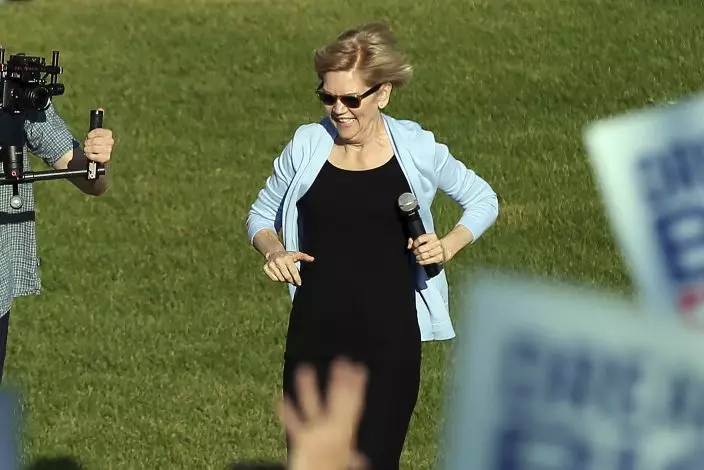
Democratic presidential candidate Elizabeth Warren, D-Mass., runs to the platform as she arrives to speak at a rally Monday, Aug. 19, 2019 at Macalaster College during a campaign appearance in St. Paul, Minn. (AP PhotoJim Mone)
She won praise from attendees for her focus and passion. But as other presidential candidates have learned, large crowds in August hardly guarantee victories in the spring.
"I think the problem is she might be too radical for people. Even though she has good plans," said Janet Plotsker, of St. Louis Park, a Minneapolis suburb.
"Not for me," she clarified. "I would vote for a cockroach if they could beat Trump."



